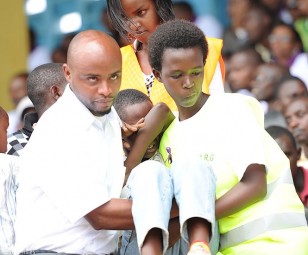Kwibuka22: Over 3,800 volunteers to help trauma victims.
By James Karuhanga, The New Times
Ibuka, the umbrella organisation for Genocide survivors’ associations, has prepared 3,800 social workers to help trauma victims during the 22nd commemoration of the 1994 Genocide against the Tutsi.
A press release signed by Ibuka president Jean-Pierre Dusingizemungu indicates that the latter will be spread out in all parts of the country so that they give essential support to victims of trauma as the nation commemorates.
Adelite Mukamana, director of Ibuka’s psycho social unit, told Sunday Times that 3,800 psycho social workers are not enough for the whole country but apart from her organisation, the ministry of health and other nongovernmental organisations have also trained other health community health workers for the task.
Mukamana said: “The target is such that at least every country village has at least two community health workers ready to work and provide basic first aid and also provide timely information so that when need be, a trauma victim can be taken to a higher level such as a health centre for further treatment.”
With time, trauma cases during commemoration are reportedly reducing as 1,515 cases were reported during Kwibuka 2015 compared to 3,094 in 2014.

During this commemoration period, Ibuka is, among other things, going to do advocacy work aimed at ensuring that issues that continue to affect survivors of the Genocide are addressed.
Key among these will include matters pertaining to justice and particularly; Gacaca courts’ asset cases that were never concluded; Genocide orphans’ properties taken by other people, and Genocide fugitives that continue to roam free in known locations worldwide.
This year’s commemoration will be held under the theme; “Kwibuka22: Fighting Genocide Ideology.”
As usual, no form of entertainment is allowed during the main commemoration week, April 7 – 13.
Government officials announced last month that during this commemoration period, more Rwandans abroad will be engaged to be part of the drive in fighting against the promotion of genocide ideology and revisionism.
Under Rwandan law, Genocide ideology is a crime defined as an aggregate of thoughts manifested by conduct, speeches, documents and other acts aiming at exterminating or inciting others to exterminate people based on their ethnic group, origin, nationality, region, colour, physical appearance, sex, language, religion or political opinion.
The crime can be committed through marginalising, laughing at one’s misfortune, defaming, mocking, boasting, despising, degrading, creating confusion aiming at negating the genocide, stirring up ill feelings, taking revenge, altering testimonies or evidence for the Genocide which occurred, killing, planning to kill or attempting to kill someone for purposes of furthering the ideology.
According to Dr Jean-Damascène Bizimana, the executive secretary of the National Commission for the Fight against Genocide (CNLG), Genocide ideology in the country has dropped by 84 per cent since 1994.
